 W
WThe forests of Mexico cover a surface area of about 64 million hectares, or 34.5% of the country. These forests are categorized by the type of tree and biome: tropical forests, temperate forests, cloud forests, riparian forests, deciduous, evergreen, dry, moist, etc.. The agency in charge of Mexico's forests is the Comisión Nacional Forestal.
 W
WThe Bajío dry forests is a tropical dry broadleaf forest ecoregion in western−central Mexico.
 W
WThe Balsas dry forests is a tropical dry broadleaf forest ecoregion located in western and central Mexico.
 W
WThe Bosque el Nixticuil is an old-growth forest located northwest of the Metropolitan Zone of Guadalajara in the Mexican town of Zapopan. An urban forest, it is encroached by the metropolitan area's constant growth. It is mostly composed of oak, holm oak and pine.
 W
WThe Central American dry forests ecoregion, of the tropical and subtropical dry broadleaf forests biome, is located in Central America.
 W
WThe Central American montane forests are an ecoregion of the tropical and subtropical moist broadleaf forests biome, as defined by the World Wildlife Fund, located in mountains of Central America.
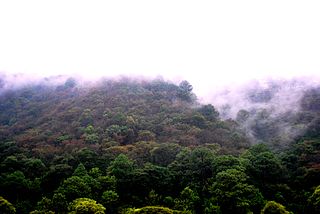 W
WThe Central American pine-oak forests ecoregion, in the tropical and subtropical coniferous forests biome, is found in Central America and Chiapas state of southern Mexico.
 W
WClosed-cone pine forest is a plant community of coastal California and several offshore islands. The plant community is often mono-dominant and single-aged, but dense with ladder fuels. Closed Cone forests grow in low nutrient and/or stressed soils, which can lead to slow growth. It consists of stands of coniferous species which rely on fire or shoot death to open their cones and release the seeds. Examples of species include coulter pine, monterey pine, and bishop pine.
 W
WCumbres del Ajusco National Park is one of many national parks near Mexico City, DF. The Ajusco is known for its high elevations reaching 3,900 meters (12,795 ft) above sea level and is visible from any part of Mexico city. The park is characterized by pine-oak forests and high mountain grassland. Cumbres del Ajusco means "watered grove peaks", an appropriate name for this mountainous region covered with lush green forest with many flowers due to a fair amount of precipitation. The Balsas and Lerma rivers begin in the heart of the Cumbres del Ajusco.
 W
WThe Jalisco dry forests is a tropical dry broadleaf forest ecoregion in southwestern Mexico.
 W
WThe Lacandon Jungle is an area of rainforest which stretches from Chiapas, Mexico, into Honduras and into the southern part of the Yucatán Peninsula. The heart of this rainforest is located in the Montes Azules Biosphere Reserve in Chiapas near the border with Guatemala in the Montañas del Oriente region of the state. Although most of the jungle outside the reserve has been partially or completely destroyed and damage continues inside the Reserve, the Lacandon is still the largest montane rainforest in North America and one of the last ones left large enough to support jaguars. It contains 1,500 tree species, 33% of all Mexican bird species, 25% of all Mexican animal species, 56% of all Mexican diurnal butterflies and 16% of all Mexico's fish species.
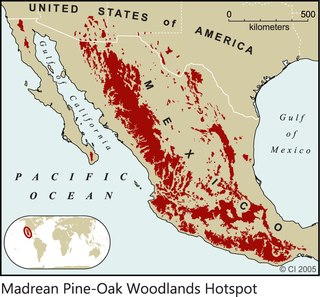 W
WThe Madrean pine–oak woodlands are an ecoregion of the Tropical and subtropical coniferous forests biome, located in North America. They are subtropical woodlands found in the mountains of Mexico and the southwestern United States.
 W
WThe Petén-Veracruz moist forests is an ecoregion of the tropical and subtropical moist broadleaf forest biome found in Belize, Guatemala, and Mexico.
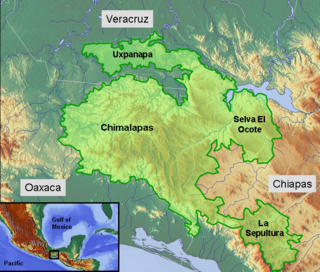 W
WThe Selva Zoque, which includes the Chimalapas rain forest, is an area of great ecological importance in Mexico. Most of the forest lies in the state of Oaxaca but parts are in Chiapas and Veracruz. It is the largest tract of tropical rainforest in Mexico, and contains the majority of terrestrial biodiversity in the country. The forest includes the Selva El Ocote, a federally protected biosphere reserve, but is otherwise not yet protected. Despite the rich ecology of the region, a 2003 study that focused on bird populations stated that "the fauna of the heart of the Chimalapas, including its vast rainforests, have seen little or no study". As it is an impoverished region, efforts to preserve the ecology are often at odds with demands to improve the economy.
 W
WThe Sierra de la Laguna dry forests are a subtropical dry forest ecoregion of the southern Baja California Peninsula in Mexico.
 W
WThe Sierra de la Laguna pine–oak forests are a subtropical coniferous forest ecoregion, found in the Sierra de la Laguna mountain range at the southern tip of the Baja California Peninsula, Mexico.
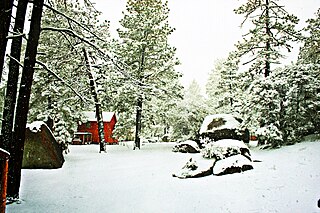 W
WThe Sierra Juárez and San Pedro Mártir pine–oak forests is an ecoregion, in the Temperate coniferous forests biome, that covers the higher elevations of the Sierra Juárez and Sierra San Pedro Mártir ranges, of the Peninsular Ranges, in the northern Baja California Peninsula of Mexico, near the border with California.
 W
WThe Sierra Madre de Oaxaca pine–oak forests is a tropical and subtropical coniferous forests ecoregion in Southern Mexico.
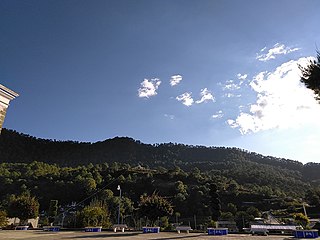 W
WThe Sierra Madre del Sur pine–oak forests is a subtropical coniferous forest ecoregion of the Sierra Madre del Sur mountain range of southern Mexico.
 W
WThe Sierra Madre Occidental pine–oak forests are a subtropical coniferous forest ecoregion of the Sierra Madre Occidental range from the southwest USA region to the western part of Mexico. They are home to a large number of endemic plants and important habitat for wildlife.
 W
WThe Sierra Madre Oriental pine–oak forests are a subtropical coniferous forest ecoregion of northeastern and Central Mexico, extending into the state of Texas in the United States.
 W
WThe Sonoran-Sinaloan transition subtropical dry forest is a tropical dry broadleaf forest ecoregion in northwestern Mexico.
 W
WThe Southern Pacific dry forests is a tropical dry broadleaf forest ecoregion in southern Mexico.
 W
WThe Trans-Mexican Volcanic Belt pine–oak forests are a subtropical coniferous forest ecoregion of the Trans-Mexican Volcanic Belt of central Mexico.
 W
WThe Veracruz dry forests are a tropical and subtropical dry broadleaf forest ecoregion located in central Veracruz, Mexico. They cover an area of 6,600 km2 (2,500 sq mi). The dry climate is a result of the rain shadow created by the Sierra de Chiconquiaco. The forests receive <1,000 mm (39 in) of annual rainfall, and a long dry season forces many plants to be deciduous. Soils are derived from sedimentary rocks and are calcareous.
 W
WThe Veracruz moist forests is a tropical moist broadleaf forests ecoregion in eastern Mexico.
 W
WThe Yucatán moist forests are an ecoregion of the tropical and subtropical moist broadleaf forests biome, as defined by the World Wildlife Fund.